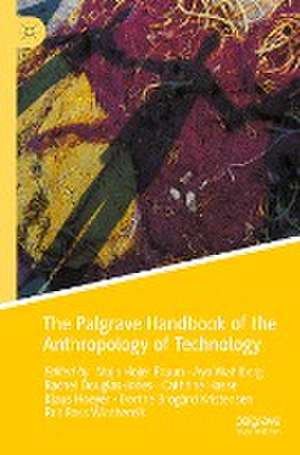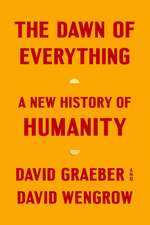The Palgrave Handbook of the Anthropology of Technology
Editat de Maja Hojer Bruun, Ayo Wahlberg, Rachel Douglas-Jones, Cathrine Hasse, Klaus Hoeyer, Dorthe Brogård Kristensen, Brit Ross Winthereiken Limba Engleză Paperback – 25 mar 2023
This Handbook offers an overview of the thriving and diverse field of anthropological studies of technology. It features 39 original chapters, each reviewing the state of the art of current research and enlivening the field of study through ethnographic analysis of human-technology interfaces, forms of social organisation, technological practices and/or systems of belief and meaning in different parts of the world.
The Handbook is organised around some of the most important characteristics of anthropological studies of technology today: the diverse knowledge practices that technologies involve and on which they depend; the communities, collectives, and categories that emerge around technologies; anthropology’s contribution to proliferating debates on ethics, values, and morality in relation to technology; and infrastructures that highlight how all technologies are embedded in broader political economies and socio-historical processes that shape and often reinforce inequality and discrimination while also generating diversity. All chapters share a commitment to human experiences, embodiments, practices, and materialities in the daily lives of those people and institutions involved in the development, manufacturing, deployment, and/or use of particular technologies.
The Handbook is organised around some of the most important characteristics of anthropological studies of technology today: the diverse knowledge practices that technologies involve and on which they depend; the communities, collectives, and categories that emerge around technologies; anthropology’s contribution to proliferating debates on ethics, values, and morality in relation to technology; and infrastructures that highlight how all technologies are embedded in broader political economies and socio-historical processes that shape and often reinforce inequality and discrimination while also generating diversity. All chapters share a commitment to human experiences, embodiments, practices, and materialities in the daily lives of those people and institutions involved in the development, manufacturing, deployment, and/or use of particular technologies.
Chapters 11 and 31 are available open access under a Creative Commons Attribution 4.0 International License via link.springer.com.
| Toate formatele și edițiile | Preț | Express |
|---|---|---|
| Paperback (1) | 1133.13 lei 6-8 săpt. | |
| Springer Nature Singapore – 25 mar 2023 | 1133.13 lei 6-8 săpt. | |
| Hardback (1) | 1139.78 lei 6-8 săpt. | |
| Springer Nature Singapore – 24 mar 2022 | 1139.78 lei 6-8 săpt. |
Preț: 1133.13 lei
Preț vechi: 1381.86 lei
-18% Nou
Puncte Express: 1700
Preț estimativ în valută:
216.89€ • 235.67$ • 182.31£
216.89€ • 235.67$ • 182.31£
Carte tipărită la comandă
Livrare economică 21 aprilie-05 mai
Preluare comenzi: 021 569.72.76
Specificații
ISBN-13: 9789811670862
ISBN-10: 9811670862
Pagini: 808
Ilustrații: XXIV, 808 p. 23 illus., 16 illus. in color.
Dimensiuni: 155 x 235 mm
Greutate: 1.14 kg
Ediția:1st ed. 2022
Editura: Springer Nature Singapore
Colecția Palgrave Macmillan
Locul publicării:Singapore, Singapore
ISBN-10: 9811670862
Pagini: 808
Ilustrații: XXIV, 808 p. 23 illus., 16 illus. in color.
Dimensiuni: 155 x 235 mm
Greutate: 1.14 kg
Ediția:1st ed. 2022
Editura: Springer Nature Singapore
Colecția Palgrave Macmillan
Locul publicării:Singapore, Singapore
Cuprins
The Anthropology of Technology: The Formation of a Field.- Section 1: Perspectives, Fields, and Approaches.- Making ‘Technology’ Visible: Technical Activities and the Chaîne Opératoire.- Technology as Skill in Handwork and Craft: Basketwork and Handweaving.- Material Culture Studies: Objectification, Agency, and Intangibility.- Feminist Technoscience and New Imaginaries of Human Reproduction.- Assemblage Ethnography: Configurations Across Scales, Sites, and Practices.- Humanism, Posthumanism, and New Humanism: How Robots Challenge the Anthropological Object.- Structuring Race into the Machine: The Spoiled Promise of Postgenomic Gene Sequencing.- An Interventional Design Anthropology of Emerging Technologies: Working Through an Interdisciplinary Field.- Computational Ethnography: A Case of Covid-19’s Methodological Consequences.- Section 2: Knowing, Unknowing, and Re-knowing.- Knowing, Unknowing, and Re-knowing.- Technology, Environment, and the Ends of Knowledge.- Charting the Unknown: Tracking the Self, Experimenting with the Digital.- Data, Knowledge Practices, and Naturecultural Worlds: Vehicle Emissions in the Anthropocene.- Set, Setting, and Clinical Trials: Colonial Technologies and Psychedelics.- Assembling Population Data in the Field: The Labour, Technologies, and Materialities of Quantification.- Peopled by Data: Statistical Knowledge Practices, Population-Making, and the State.- Data Practices and Sustainable Development Goals: Organising Knowledge for Sustainable Futures.- Section 3: Communities, Collectives, and Categories.- Communities, Collectives, and Categories.- Un/Doing Race: On Technology, Individuals, and Collectives in Forensic Practice.- Learning, Technology, and the Instrumentalisation of Critique.- Technology, Gender, and Nation: Building Modern Citizens in Maoist China.- Imagineerism: Technology, Robots, Kinship. Perspectives from Japan.- Collectivities and Technological Activism: Feminist Hacking.- Inside Technology Organisations: Imaginaries of Digitalisation at Work.- Section 4: Ethics, Values, and Morality.- Ethics, Values, and Morality.- Moral Ambiguities: Fleshy and Digital Substitutes in the Life Sciences.- Enacting Authenticity: Changing Ontologies of Biological Entities.- Technologies of Beauty: The Materiality, Ethics, and Normativity of Cosmetic Citizenship.- The Optimised and Enhanced Self: Experiences of the Self and the Making of Societal Values.- Articulations of Ethics: Energy Worlds and Moral Selves.- Competing Responsibilities and the Ethics of Care in Young People’s Engagements with Digital Mental Health.- Committee Work: Stem Cell Governance in the United States.- Section 5: Infrastructures, Linkages, and Livelihoods.- Infrastructures, Linkages, and Livelihoods.- Accumulation: Exploring the Materiality of Energy Infrastructure.- Food Infrastructures and Technologies of Trust in Contemporary China.- Water Infrastructures: The Making and Maintenance of Material and Organisational Connections.- Electricity as a Field for Anthropological Theorizing and Research.- Circuit Board Money: An Infrastructural Perspective on Digital Payments.
Notă biografică
Maja Hojer Bruun is Associate Professor at the Department of Educational Anthropology, Aarhus University.
Ayo Wahlberg is Professor MSO at the Department of Anthropology, University of Copenhagen.
Rachel Douglas-Jones is Associate Professor at the Department of BusinessIT, IT University of Copenhagen.
Cathrine Hasse is Professor at the Department of Educational Anthropology, Aarhus University.
Klaus Hoeyer is Professor at the Department of Public Health, University of Copenhagen.
Dorthe Brogård Kristensen is Associate Professor at the Department of Business and Management, University of Southern Denmark.
Brit Ross Winthereik is Professor at the Department of BusinessIT, IT University of Copenhagen.
Ayo Wahlberg is Professor MSO at the Department of Anthropology, University of Copenhagen.
Rachel Douglas-Jones is Associate Professor at the Department of BusinessIT, IT University of Copenhagen.
Cathrine Hasse is Professor at the Department of Educational Anthropology, Aarhus University.
Klaus Hoeyer is Professor at the Department of Public Health, University of Copenhagen.
Dorthe Brogård Kristensen is Associate Professor at the Department of Business and Management, University of Southern Denmark.
Brit Ross Winthereik is Professor at the Department of BusinessIT, IT University of Copenhagen.
Textul de pe ultima copertă
This Handbook offers an overview of the thriving and diverse field of anthropological studies of technology. It features 39 original chapters, each reviewing the state of the art of current research and enlivening the field of study through ethnographic analysis of human-technology interfaces, forms of social organisation, technological practices and/or systems of belief and meaning in different parts of the world.
The Handbook is organised around some of the most important characteristics of anthropological studies of technology today: the diverse knowledge practices that technologies involve and on which they depend; the communities, collectives, and categories that emerge around technologies; anthropology’s contribution to proliferating debates on ethics, values, and morality in relation to technology; and infrastructures that highlight how all technologies are embedded in broader political economies and socio-historical processes that shape and often reinforce inequalityand discrimination while also generating diversity. All chapters share a commitment to human experiences, embodiments, practices, and materialities in the daily lives of those people and institutions involved in the development, manufacturing, deployment, and/or use of particular technologies.
The Handbook is organised around some of the most important characteristics of anthropological studies of technology today: the diverse knowledge practices that technologies involve and on which they depend; the communities, collectives, and categories that emerge around technologies; anthropology’s contribution to proliferating debates on ethics, values, and morality in relation to technology; and infrastructures that highlight how all technologies are embedded in broader political economies and socio-historical processes that shape and often reinforce inequalityand discrimination while also generating diversity. All chapters share a commitment to human experiences, embodiments, practices, and materialities in the daily lives of those people and institutions involved in the development, manufacturing, deployment, and/or use of particular technologies.
Caracteristici
Fills a substantial gap in the scholarly and academic literature addressing social studies of technology Timely, topical and unique exposition of the subject, which will be required reading for years to come Cutting-edge resource for students in anthropology, STS courses and related disciplines





